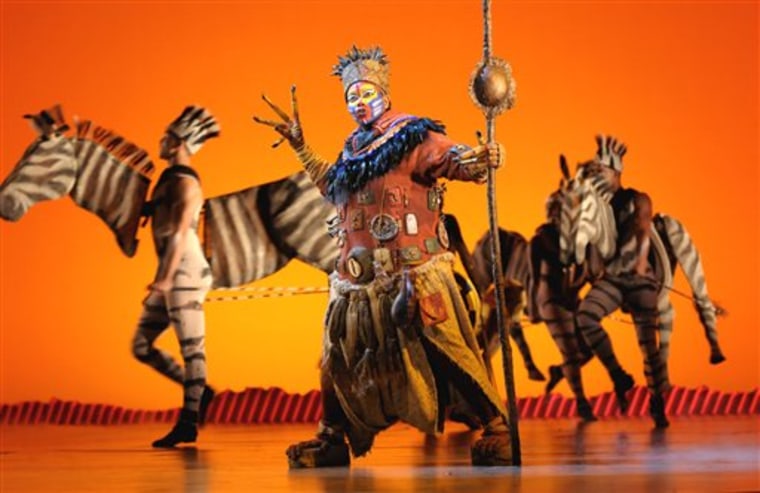Families of autistic children have a new place to engage their sons and daughters — Broadway.
The Theatre Development Fund, a nonprofit organization focused on providing access to live theater, announced Wednesday it will present an autism friendly performance of "The Lion King."
The Oct. 2 matinee of the long-running musical at the Minskoff Theatre will be slightly altered to make those with autism more comfortable, including cutting jarring sounds and strobe lights.
"We are so excited about this and, at the same time, I'm apprehensive because no one has ever done this before," said Lisa Carling, the director of the fund's accessibility program. "No one knows what the effect will be when you put 500 to 600 children and adults on the autism spectrum in an over 1,600-seat theater."
Three quiet areas with beanbag chairs and coloring books, staffed by autism experts, will be created inside the theater for those who might feel overwhelmed. Ticket prices have also been reduced, with the top seats going for $79, down from the top range of $133.
The fund bought every seat in the theater to gauge interest and word-of-mouth has already left few seats available. Organizers, who say this is the first time such an experiment has been attempted on Broadway, want to see if it should be replicated at other productions.
"We'll be looking at the dynamics of the audience, seeing if everyone is having a good time," said Carling. "We want it to be a very welcoming, nonjudgmental environment."
Autism disorders strike one in 100 children, according to U.S. government estimates. Children with the diagnosis are often sensitive to loud noises and harsh lights, and find it hard to sit still or remain quiet. Autism spectrum disorders include both severe and relatively mild symptoms.
For many families who have a child with autism just going out to a restaurant — much less a live theatrical event — is a daunting proposition.
Alicia Hart, an advocate for children and adults with autism and author of "Brains, Trains & Video Games: Living The Autism Life," welcomed the experiment, calling it "great leap into the future."
"Theater, in and of itself, is a phenomenal vehicle for children with autism," she said from her home on Merritt Island, Florida. Autistic children, she explained, must learn in public to modulate their voices, their bodies and their facial expressions — just like performers.
"In essence, they're really acting — they're acting their way through life. This is the greatest performance that they'll ever give and it doesn't stop," said Hart. "The theater is not used enough as a teaching tool and this is going to open a lot of doors."
To accommodate the special audience, experts identified several moments in "The Lion King" when the sound or lights needed to be toned down, but none was more than 30 percent softened. There were seven changes in all, including the volume adjusted down in the opening number, to steam blasts and to Mufasa's roar at the Elephant Graveyard.
A 16-page downloadable guide available at the fund's website tells children with autism what to expect during the show, including what ushers do and what to do during a curtain call.
"If I want to clap, I can. I don't have to clap if I don't want to. If the clapping is too loud, I can cover my ears, wear my headphones, or hold my Mommy or Daddy's hand," the guide advises.
At another point, the guide tells the children not to be scared by the actors: "Some of the animals and singers may come close to me. The animals are not real; they are just actors wearing costumes and makeup, like on Halloween."
The advocacy group Autism Speaks, noting how restaurants and movie houses are reaching out to autistic kids, helped the fund figure out how to make children with autism feel more comfortable at the theater.
"There's definitely a nice movement in that direction to accommodate families with autism and be more compassionate," said Dana Marnane, an executive at Autism Speaks.
Hart acknowledged that having a theater filled with children with widely different needs and abilities may be stressful, but at least it's a start. And even if the experiment is deemed a failure, she said there likely will be lessons for the next attempt.
"There are going to be children who go to this and it's still not going to be right for them. It's not maybe the right fit, maybe not the right time, maybe they're not ready for this. But that doesn't mean we stop trying," she said.
"The Lion King," recommended for children 6 and up, runs a comfortable two and one half hours, including one intermission. All the changes to the musical were made with the approval and blessing of Disney Theatrical Productions, the fund said, and everyone from the ushers to the actors are on board.
Carling said the fund recently received an inspirational email from a mother in upstate New York who said she was tired of trying to take her autistic child to a musical and have people stare at her and her child.
"There are so few opportunities so hopefully this is the beginning of many more," Carling said.
